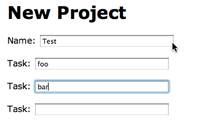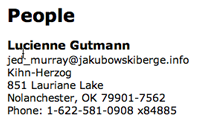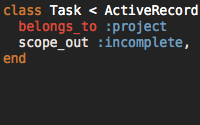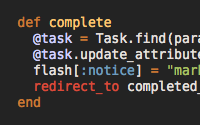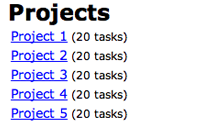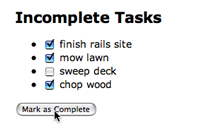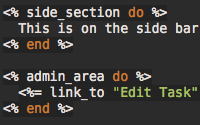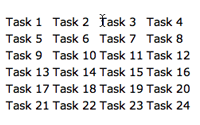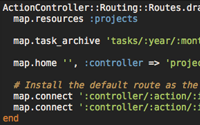Categories
- Active Record
- Active Resource
- Active Support
- Administration
- Ajax
- APIs
- Authentication
- Authorization
- Background Jobs
- Caching
- Code Walkthrough
- Controllers
- Debugging
- Deployment
- eCommerce
- Forms
- Mailing
- Models
- Performance
- Plugins
- Production
- Rack
- Rails 2.0
- Rails 2.1
- Rails 2.2
- Rails 2.3
- Rails 3.0
- Rails 3.1
- Rails 3.2
- Rails 4.0
- Refactoring
- Routing
- Search
- Security
- Testing
- Tools
- Views
Applied Filters:
task x
Rails Engines
Rails 2.3 brings us much of the same functionality as the Rails Engines plugin. Learn how to embed one application into another in this episode.
(8 minutes)
Complex Forms Part 1
Complex forms often lead to complex controllers, but that doesn't have to be the case. In this episode see how you can create multiple models through a single form while keeping the controller clean.
(8 minutes)
Populating a Database
Have you ever wanted to fill up a database with a lot of test data? See how to do that in this episode using the populator and faker gems.
(8 minutes)
scope_out
The scope_out plugin will generate several helpful find methods for you automatically! It's the best way to move the find conditions into your model. Watch this episode for details.
(6 minutes)
Custom REST Actions
REST adds many constraints. It restricts your controllers to seven actions. Normally this is okay, but sometimes you need to add your own custom actions. Learn how in this episode.
(8 minutes)
Counter Cache Column
If you need to display the record count for a has_many association, you can improve performance by caching that number in a column.
(7 minutes)
Update through Checkboxes
See how to select multiple items using checkboxes and perform an action on the selected items in this episode.
(10 minutes)
Blocks in View
If you try to create a helper method which accepts a block, you will run into a few gotchas. Learn the secrets of blocks in views in this episode.
(9 minutes)
in_groups_of
Have you ever wanted to visually line up items in rows and columns? The in_groups_of method makes this a cinch. Just watch out for the gotcha.
(4 minutes)
Named Routes
When you add a custom route, make it a named route so you have url helper methods to easily link to that new route. See episode for details.
(6 minutes)


